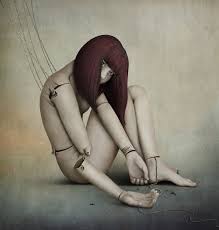50 Shades of Grey is not a movie about BDSM, not really. The sex scenes are hot. Anastasia Steele (Dakota Johnson) has a great body and a very innocent face -- and she is very convincing that she is both turned on and enjoying some kinky sex. She portrays a healthy college student swept off her feet (almost) by a young, attractive, and rich business man Christian Grey (Jamine Dornan). Christian however by his own words is “50 Shades of F**ked Up”. He is a control freak which is obvious from the beginning. He orchestrates and controls everything -- and he electronically stalks her, showing up when she’s doing something beyond his “rules” for her. This movie shines a light on a cultural problem that is seldom discussed openly. 
Christian is a control freak that sometimes crosses the line into abusive behavior. He goes through the motion of negotiating a BDSM relationship with Anastasia. But, it is a little bit of a farce because it is a carefully crafted document with the agenda already established, only the details are being negotiated. From my limited experience in that world (one can only hope for more), BDSM love scenes are typically negotiated at infinitum to the point that I think the suspense and mystery of the event is lost. But, that’s just me. But, they don’t typically sign a contract on a lifestyle, living conditions, or schedule as was done in the movie. Ideally, people in BDSM verbally negotiate on equal terms the details of what is going to happen in one love scene. And of course, they have safety words to slow (yellow) or stop (red) the action.
So, 50 Shades is not about BDSM as practiced by most, although the BDSM scenes are delicious. So, is the movie about abuse? The last scene in the first of three movies is about abuse, kind of. Anastasia is upset about the whole idea of punishment (although punishment can vary in BDSM from playful to really painful) and she asks Christian who is already annoyed by something happening at work “to show me the worst it (punishment) can be”. People being abused don’t ask for it …
From that point she tolerates a rough belt spanking from him while she is bound and naked. He has her count off the swats. Unlike in an earlier scene where she is playfully, but roughly spanked, this time she is spanked by an angry Christian who seems to be attacking his own demons which “live in her buttocks”.
Anastasia does not use her safe words and tolerates the spanking, beginning to cry at the end. When she is untied, she is angry and retreats to her room. She orders him out of the room telling him she is starting to fall in love with him. Well, looks to me like they have been in love for half the movie … who wouldn’t love her! And, Christian is not without his charms and truly does seem to care about her. She does what she has to do the next morning and leaves without a lot of discussion beyond her statement the night before that she does not understand his desire/need to punish her. There is no arguing that Christian was being abusive, but one could argue that Anastasia never really plays the typical role of an abused woman; she never accepts the role and loses herself - at least in this first movie.
The Man is in Charge
I believe the movie poses the question: “When does controlling another become abusive?” Control of one’s mate, especially men controlling “their woman”, abounds in our culture. The control is derived from a sense of ownership deeply embedded in our culture when two people become a couple. Historically, a wife was a man’s property. Today we think we have moved beyond that thinking, but it’s still present. It begins with joking remarks about YOUR “other half” or “better half.”
Control can be subtle like a man keeping track of where a woman goes or monitoring her time away, or snooping on her conversations with others. Control can also evolve by expectations. Women in our culture are expected to take care of the house, the kids, work a job, etc. usually without negotiation or discussion with her mate. The husband, in expecting the wife to fulfill her cultural role without them both considering other options, is helping to perpetuate a system that is generally not fair to women and in a subtle way controls their lives. If a house is unkept, who gets blamed in our society? What about if children don’t have clean clothes? This is our culture, this is us, controlling women.
From there the control can become more blatant, and the man may push the wife to wear clothing that he approves of, for example more sexy or less sexy. He may expect or demand dinner on the table at a certain time; he may want or demand to know where she is at all times or who she has talked to, etc. We all either know or have been the controlling “man/husband” at times.
At what point does control become abusive?
I am not an expert on abusive relationships, but I know a woman very well that lives with an abusive husband. He owns her and controls her by fear and intimidation. Neither had a great start in life. She was abused as a child and ran away from home at the age of 13. He spent his younger days fighting on the street. Somewhat characteristically, he belittles her and attempts to blame his abuse on her just not getting it and provoking him. She fears what will happen to their children if they got divorced and he was awarded shared custody. For awhile she tried to drag him to couple's therapy, but he always treated it as a joke. She has tried to save him from himself for the five years I have known her. Emotionally she believes “If I can just be good enough, love him enough, perhaps he will change”. It is a subset of the belief that many woman have, “I am not good enough”.
One thing different about my friend than what we usually think of in abusive relationships is that this woman is college educated and makes a very good salary as a manager. She is able to support herself and her children, so she is not also trapped by money concerns as many women are. But, she lives and accepts being owned by her husband. And guess what, she doesn’t stand out from the crowd at her PTA Meetings.
The Dialogue About Abusive Relationships
Perhaps 50 Shades of Grey is opening up the dialogue about what constitutes an abusive relationship. Estimates go that at about 1 in 4 women live in an abusive relationship in this country. In the Middle East countries I would guess it is more like 9 out of 10…. at least by our standards.
Excessive Control and Abuse is wrong, we can all agree on that. But is a little bit of control okay? Is the ownership model of marriage / relationships okay at any level? Should all relationships stand on a foundation of negotiation among consenting adults? Should we seek to identify and weed out cultural expectations of what a marriage / relationship should be?
The first movie of the 50 Shades trilogy was better than the book. Let us hope that the next two movies are also better. Perhaps, Christian will get some therapy and it will be more believable when he turns into a perfect husband. At least, it’s refreshing that this movie does not yet perpetuate the Cinderella view of marriage where the roles for the Prince and the Princess are clearly defined without negotiations, and the Prince and Princess are destined for - without any effort - happily ever after.
Much thanks to Amy for helping me formulate and express my ideas and for her helpful (and sometimes painful) editing.
Robert R. Odle
No comments:
Post a Comment